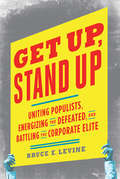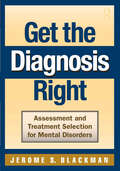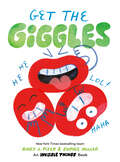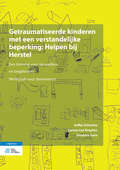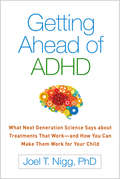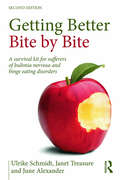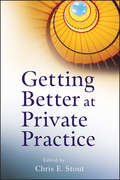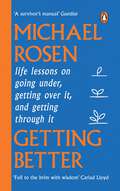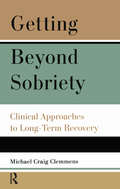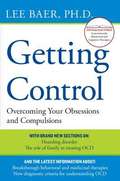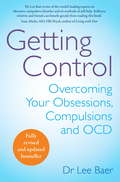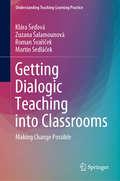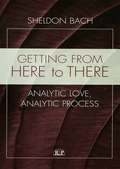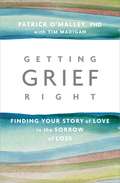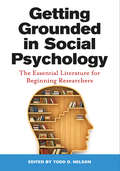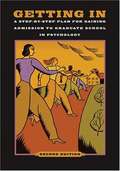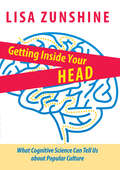- Table View
- List View
Get Up, Stand Up: Uniting Populists, Energizing the Defeated, and Battling the Corporate Elite
by Bruce E. Levine"Are Americans a Broken People?" Levine, a practicing clinical psychologist and frequent writer on political matters, asked in a 2009 web article, meditating on the problem of American political passivity in the face of attacks on their liberties and their economic well-being. In this work, he expands on that article, exploring the cultural and psychological reasons many Americans feel politically demoralized and considering the means of regaining the individual self-respect and collective self-confidence that are prerequisites for building mass democratic politics (based on a populism transcending right/left divisions) that can overcome the current control of the American political system by elites. Annotation ©2011 Book News, Inc. , Portland, OR (booknews. com)
Get Well Soon
by Julie HalpernWhen her parents confine her to a mental hospital, an overweight teenage girl, who suffers from panic attacks, describes her experiences in a series of letters to a friend.
Get Your Life Back: The Most Effective Therapies For A Better You
by David Pearson Dr. Fiona KennedyHIGHLY COMMENDED for the British Medical Awards book prize for Popular MedicineMost of us have some behaviours which are not fully under our control but when those start interfering with our lives and with who we want to be, we need this book. When we turn away from opportunity and excitement in case it makes us anxious, we lose the joy in our lives and can experience misery and depression as well as, oddly, even more anxiety. Get Your Life Back helps you to identify what is really important to you and to notice the ways in which you behave which interfere with reaching your goals and following valued directions. It shows how to understand your own behaviour with compassion, without judgement, and how to both accept and change unhelpful or damaging ways of acting. You will learn new skills to manage emotion and endure discomfort as you journey towards mindful self-control.Uniquely, this book presents a blend of evidence-based treatments (CBT, ACT, DBT, compassion and mindfulness) giving you the best and most effective therapies for a better you.
Get the Diagnosis Right: Assessment and Treatment Selection for Mental Disorders
by Jerome S. BlackmanDr. Jerome Blackman, author of 101 Defenses: How the Mind Shields Itself, has once again crafted an extraordinarily user-friendly book that demonstrates to all readers, from trainees to advanced analysts, the process of diagnosing mental disturbance. Get the Diagnosis Right provides a systematic method for accurately determining whether a person suffering with mental problems needs medication, supportive/cognitive, dynamic, and/or psychoanalytic treatment. Amalgamating the most useful ideas from general psychiatry, cognitive psychology, and modern psychoanalytic theory, Dr. Blackman guides readers who prescribe treatment for mental disturbances. The book also serves as a check for those who are considering what type of mental health professional they should be consulting.After reading this book, you will no longer have to guess whether a depressed patient should obtain medication, supportive therapy, insight therapy, or some mixture of the three; or question how to conduct an initial interview and assessment. Written in language that is clear but not simplistic, this book goes far beyond other diagnostic manuals.
Get the Giggles: An Invisible Things Book (Invisible Things)
by Andy J. Pizza Sophie MillerBring on the giggles with this wonderfully wacky board book from the creators of the New York Times bestseller Invisible Things. When you feel fed up, how do you lift your mood? Laugh out loud as you turn the pages to see how funny pretend laughter can be! With this book in hand, take a moment to be silly, boost your mood, and experience joy and connection through laughter.Invisible Things introduced the wonderful concept of exploring the invisible things that make up the human experience, encouraging us to look past the visible and connect with the things that are not seen. This inviting board book brings the idea into an interactive format, offering kids a fun and engaging way to learn about their emotions.FUNNY BOOK FOR THE WHOLE FAMILY: For those times you (and your little one) just need a good laugh! Do you know how to tell a hee-hee from a ha-ha? Do you need a little giggle or a giant guffaw? Whatever laugh you’re looking for, this positive feelings book will show you how to find it.SOCIAL EMOTIONAL LEARNING: This guided exercise-in-a-book will have you embodying new emotions—and feeling giggly—in no time. REVIEWED BY MENTAL HEALTH EXPERT: This book was vetted by a licensed independent clinical social worker specializing in mental health for kids. Pair it with the Invisible Things book or Invisible Things Feelings Flash Cards to create an effective home or classroom resource.POPULAR AUTHOR: Andy J. Pizza is one of the creative minds behind several children’s books, including the bestselling Invisible Things, A Pizza with Everything on It, and A Sundae with Everything on It. He also hosts the popular podcast Creative Pep Talk.Perfect for:Parents, grandparents, caregivers, teachers, and educatorsAnyone interested in social-emotional learning (SEL) and entertaining ways to explore emotions with kidsAnyone looking for interactive books about emotional health for babies and toddlersYoung readers who enjoy tactile board books like Press Here and Mix It Up!Fans of Pixar's Inside OutFans of Andy J. Pizza, the Creative Pep Talk podcast, or his bestselling books, including Invisible Things and A Pizza with Everything on It
Get the Guy: Learn Secrets of the Male Mind to Find the Man You Want and the Love You Deserve
by Matthew HusseyMost dating books tell you what NOT to do. Here's a book dedicated to telling you what you CAN do.In his book, Get the Guy, Matthew Hussey—relationship expert, matchmaker, and star of the reality show Ready for Love—reveals the secrets of the male mind and the fundamentals of dating and mating for a proven, revolutionary approach to help women to find lasting love.Matthew Hussey has coached thousands of high-powered CEOs, showing them how to develop confidence and build relationships that translate into professional success. Many of Matthew’s male clients pressed him for advice on how to apply his winning strategies not to just get the job, but how to get the girl. As his reputation grew, Hussey was approached by more and more women, eager to hear what he had learned about the male perspective on love and romance.From landing a first date to establishing emotional intimacy, playful flirtation to red-hot bedroom tips, Matthew’s insightfulness, irreverence, and warmth makes Get the Guy: Learn Secrets of the Male Mind to Find the Man You Want and the Love You Deserve a one-of-a-kind relationship guide and the handbook for every woman who wants to get the guy she’s been waiting for.
Get the Life You Want: The Secrets to Quick and Lasting Life Change with Neuro-Linguistic Programming
by Richard BandlerRichard Bandler is known worldwide as the cofounder of neurolinguistic programming (NLP). Here, in what will be considered a classic, is Bandler at his best—the most accessible and engaging work yet, detailing his proven methods that have freed tens of thousands of people worldwide of their destructive habits, phobias,and fears. When conventional therapy and drugs fail, Richard Bandler delivers, often with miraculous results. Richard Bandler cocreated the field of NLP with John Grinder in the early 1970s. Since then, Bandler's work revolutionized the field of personal change; his models and methods have been widely adopted and used successfully in colleges and universities, therapists'offices, professional sports teams, and businesses across the globe. While many people have written books on NLP, much of what has been written is based on Bandler's ideas. Get The Life You Want shares 'the how' from Bandler himself, with remarkable insights into some of his greatest and most advanced work to date, including compelling true examples from client sessions. With more than thirty exercises that promise rapid relief from any problem or habit, plus a glossary of terms and a detailed index, this is a culmination of a lifetime of work written in a simple, engaging style that both clinicians and laypeople will find effective. Richard Bandler's books have sold more than half a million copies worldwide. Tens of thousands of people, many of them therapists, have studied Bandler's blend of hypnosis, linguistics, and positive thinking at colleges and NLP training centers in the United States, Europe, and Australia. He is the author of Using Your Brain—for a Change, Time for Change, Magic in Action, and The Structure of Magic. He coauthored Frogs into Princes, Persuasion Engineering, The Structure of Magic Volume II, and Patterns of the Hypnotic Techniques of Milton H. Erickson Volume I.
Geteilte Führung: Ein Überblick über den aktuellen Forschungsstand (essentials)
by Simon WertherDer Autor beschäftigt sich mit geteilter Führung als moderner Führungsform, die es ermöglicht, aktuellen Herausforderungen im organisationalen Alltag erfolgreich zu begegnen. Dabei werden, aufbauend auf dem aktuellen Forschungsstand, Anhaltspunkte für die wissenschaftliche Bedeutung geteilter Führung systematisch aufgearbeitet und dargestellt. Darüber hinaus enthält der Beitrag eine Abgrenzung geteilter Führung in Bezug auf ähnliche Konstrukte sowie eine Darstellung unterschiedlicher wissenschaftlicher Messmethoden, welche für den Zusammenhang zwischen geteilter Führung und Teameffektivität von großer Relevanz sind.
Getraumatiseerde kinderen met een verstandelijke beperking: Een training voor opvoeders en begeleiders. Handleiding voor trainers
by Aafke Scharloo Carina van Kregten Giuditta SoroDeze training helpt om kinderen met een verstandelijke beperking de juiste hulp te bieden na een traumatische ervaring. En om met de kinderen én hun gezin aan herstel te werken. Het is bedoeld voor professionals, ouders, pleegouders en andere direct betrokkenen.Het is een training die bestaat uit een handleiding voor trainers en een werkboek voor deelnemers met powerpoint dia’s en werkbladen als extra materiaal. De opzet is vergelijkbaar met onze succesvolle uitgave 'Zorgen voor getraumatiseerde kinderen'.
Getraumatiseerde kinderen met een verstandelijke beperking: Een training voor opvoeders en begeleiders. Werkboek voor deelnemers
by Aafke Scharloo Carina van Kregten Giuditta SoroDeze training helpt om kinderen met een verstandelijke beperking de juiste hulp te bieden na een traumatische ervaring. En om met de kinderen én hun gezin aan herstel te werken. Het is bedoeld voor professionals, ouders, pleegouders en andere direct betrokkenen.Het is een training die bestaat uit een handleiding voor trainers en een werkboek voor deelnemers met powerpoint dia’s en werkbladen als extra materiaal. De opzet is vergelijkbaar met onze succesvolle uitgave 'Zorgen voor getraumatiseerde kinderen'.
Getting Ahead of ADHD: What Next-Generation Science Says about Treatments That Work—and How You Can Make Them Work for Your Child
by Joel T. NiggDoes toxic pollution cause attention-deficit/hyperactivity disorder (ADHD)? What about screen use? Are alternative treatments worth exploring? Can dietary changes help? From leading ADHD researcher Joel T. Nigg, this book presents exciting treatment advances grounded in the new science of epigenetics--how genes and the environment interact. Distinguishing unsupported, even dangerous, approaches from bona fide breakthroughs, Dr. Nigg describes specific lifestyle changes that have been proven to support the developing brain. Vivid stories illustrate ways to maximize the positive effects of healthy nutrition, exercise, and sleep, and minimize the damage from stress and other known risk factors. The book helps you figure out which options hold the most promise for improving your child's symptoms and overall well-being--and gives you step-by-step suggestions for integrating them into daily life.
Getting Better Bite by Bite: A Survival Kit for Sufferers of Bulimia Nervosa and Binge Eating Disorders
by Janet Treasure June Alexander Ulrike SchmidtGetting Better Bite by Bite is an essential, authoritative and evidence-based self-help programmethat has been used by bulimia sufferersfor over 20 years. This new edition maintains the essence of the original book, while updating its content for today's readers, drawing on the latest knowledge of the biology and psychology of bulimia and its treatment. The book provides step-by-step guidance for change based on solid research. The use of everyday language, stimulating contemporary case study story-telling and evocative illustrations in Bite by Bite provide encouragement, hope and new perspectives for all readers. This handy-sized book fills a need for easy-to-understand information about Bulimia Nervosa, a serious and prevalent eating disorder. Ulrike Schmidt and Janet Treasure are world-renowned researchers and authorities on eating disorders, and June Alexander, a former sufferer of anorexia and bulimia, is a respected writer and internationally-known eating disorder awareness advocate. Getting Better Bite by Bite is a valuable resource - for sufferers, for their families, and for the health professionals and carers treating them.
Getting Better at Private Practice
by Chris E. StoutExpert advice for building your private practice The "business" of practice as a mental health professional is a skill that is seldom taught in school and requires thoughtful guidance and professional mentorship from those who have already succeeded. Containing the collective wisdom and secrets of many expert practitioners, this helpful resource provides useful insights for setting up, managing, and marketing your practice, including timely advice on being a successful provider in the digital age-from Internet marketing to building your online presence. Designed for private practices of any size and at any stage of development, this practical guide looks at: Creating your dream niche practice Choosing the right technological tools and resources to simplify and streamline your job Leveraging the Internet to market your practice Developing a practice outside of managed care Transitioning to executive coaching Ethical and legal aspects of private practice Full of action-oriented ideas, tips, and techniques, Getting Better at Private Practice provides both early career and seasoned mental health professionals with the knowledge and tools they need to establish, develop, and position their practice so that it is financially successful and life-enriching over the long term.
Getting Better: Life lessons on going under, getting over it, and getting through it
by Michael RosenIn our lives, terrible things may happen. Michael Rosen has grieved the loss of a child, lived with debilitating chronic illness, and faced death itself when seriously unwell in hospital. In spite of this he has survived, and has even learned to find joy in life in the aftermath of tragedy.In Getting Better, he shares his story and the lessons he has learned along the way. Exploring the roles that trauma and grief have played in his own life, Michael investigates the road to recovery, asking how we can find it within ourselves to live well again after - or even during - the darkest times of our lives. Moving and insightful, Getting Better is an essential companion for anyone who has loved and lost, or struggled and survived.
Getting Beyond Sobriety: Clinical Approaches to Long-Term Recovery
by Michael C. ClemmensIn this ground-breaking book, Michael Clemmens offers a new model of treatment for long-term recovery which goes beyond the traditional "disease" paradigm. Working from the belief that a fuller life for the recovering addict is grounded on a foundation of abstinence, the author explores a "self-modulation" approach which leads to a change in the behavior from within the individual while developing and expanding connection with others.
Getting Control
by Lee BaerThoroughly revised and updated--the go-to book for OCD sufferers who want to master their fears and take charge of their livesThe first comprehensive guide to treating obsessive compulsive disorder based on clinically proven behavioral therapy techniques, Dr. Lee Baer's Getting Control has been providing OCD sufferers with information and relief for more than twenty years. In the same easy-to-understand format as the original, this updated edition includes: * Cutting-edge behavioral therapy techniques * Breakthrough advances in neuroscience * Brand new material on hoarding * Expanded sections on how families can help OCD sufferers * The latest diagnostic standards as outlined by the American Psychiatric Association * A completely revised list of resources OCD sufferers and their loved ones will find everything they need to assess their symptoms, set realistic goals, and create specific therapeutic exercises for managing this disorder.
Getting Control: Overcoming Your Obsessions, Compulsions and OCD
by Dr. Lee BaerThe first comprehensive guide to treating obsessive-compulsive disorder based on clinically proven behavioral therapy techniques, Dr. Lee Baer's Getting Control has been providing OCD sufferers with information and relief for more than twenty years. In the same easy-to-understand format as the original, this updated edition includes:Cutting-edge behavioral therapy techniques.Breakthrough advances in neuroscience.Brand-new material on hoarding.Expanded sections on how families can help OCD sufferers.The latest diagnostic standards.A completely revised list of resources.OCD sufferers and their loved ones will find everything they need to assess their symptoms, set realistic goals, and create specific therapeutic exercises for managing this disorder.
Getting Dialogic Teaching into Classrooms: Making Change Possible (Understanding Teaching-Learning Practice)
by Klára Šeďová Zuzana Šalamounová Roman Švaříček Martin SedláčekThis book contributes to our understanding how teachers can improve classroom dialogue and thereby boost student learning.The book reports the results of intervention research based on professional development program for teacher. Participating teachers strived, with the help of the researchers, to instigate a rich and authentic dialogue in their classrooms. The data shows that teachers were able to change their talk and interaction patterns, and this was followed by a desirable change in their students who started to talk more and expressed more complex thoughts.The book not only reports on a successful intervention, but most importantly investigates in depth the teacher experiences and ways of learning during the intervention project.
Getting From Here to There: Analytic Love, Analytic Process (Relational Perspectives Book Series #32)
by Sheldon BachIt is clinical work with the most difficult patients - those with severe narcissistic, sadomasochistic, and borderline disorders - that poses the greatest challenge to the therapist's guiding assumptions about clinical process; indeed, such work often leads therapists to question beliefs and expectations that formerly seemed self-evident. In Getting From Here to There: Analytic Love, Analytic Process, Sheldon Bach elaborates the holistic vision that guides him in work with just such patients. He dwells especially on the "attentive presence" through which the analyst effects a "meeting" with patients that invites the latter's trust in the analyst and in the therapeutic process. And he writes of love - of patient for analyst and of analyst for patient - that grows out of this mutual trust and sustains therapeutic process. For Bach, analytic therapy aims at understanding the person as a mind-body unity that manifests particular states of consciousness. This holistic vision of treatment sustains a flexible clinical orientation that enables the analyst to "meet" states of consciousness in order to bring them into a system of which the analyst forms a part. Bach thoughtfully explores the clinical issues that enter into this taxing process, among them the establishment and maintenence of basic trust; the patient's or the therapist's presence in the other's mind; and the shifts in agency between patient and therapist. And he describes at length the frequently exhausting, even demoralizing, transference-countertransference struggles that enter into this type of analytic work. Throughout, Bach is guided by the conviction that work with extremely challenging patients promotes the psychological growth and increased self-knowledge of patient and analyst alike. And he is admirably clear that the "mutual living through" of such treatments nurtures a kind of love between patient and analyst. Getting From Here to There not only records the clinical lessons learned by an unusually gifted analyst; it also chronicles the movement of psychoanalysis itself from the dissection of love into component parts to a synthetic grasp of its vital role in psychoanalytically informed treatment.
Getting Grief Right: Finding Your Story of Love in the Sorrow of Loss
by Patrick O'Malley Tim MadiganWhen the New York Times ran Patrick O'Malley's story about the loss of his infant son--and how his inability to "move on" challenged everything he was taught as a psychotherapist--it inspired an unprecedented flood of gratitude from readers. What he shared was a truth that many have felt but rarely acknowledged by the professionals they turn to: that our grief is not a mental illness to be cured, but part of the abiding connection with the one we've lost. <p><p> Illuminated by O'Malley's own story and those of many clients that he's supported, readers learn how the familiar "stages of grief" too often mislabel our sorrow as a disorder, press us to "get over it," and amplify our suffering with shame and guilt when we do not achieve "closure" in due course. <p> "Sadness, regret, confusion, yearning--all the experiences of grief--are a part of the narrative of love," reflects O'Malley. Here, with uncommon sensitivity and support, he invites us to explore grief not as a process of recovery, but as the ongoing narrative of our relationship with the one we've lost--to be fully felt, told, and woven into our lives. <p>For those in bereavement and anyone supporting those who are, Getting Grief Right offers an uncommonly empathetic guide to opening to our sorrow as the full expression of our love.
Getting Grounded in Social Psychology: The Essential Literature for Beginning Researchers
by Todd D. NelsonThis volume provides a fast and efficient way for undergraduate and graduate students to gain a solid understanding of the social psychology literature. Each chapter reviews a major subsection of research in the field, written by a leading social psychology researcher in that area. Coverage includes all the major empirical, theoretical and methodological developments in its subfield of social psychology. Beginning social psychologists, as well as those who may have emerged from their formal training with a less-than-solid grounding in the research literature, will find this volume invaluable. It is the book all social psychologists wished they had access to when they were getting grounded in the research literature!
Getting In: A Step-by-Step Plan For Gaining Admission to Graduate School In Psychology (Second Edition)
by American Psychological AssociationGetting In, Second Edition is an update of the American Psychological Associations essential resource for anyone considering graduate study in psychology. This handy, readable book simplifies the process for applicants and increases their chances of being accepted. Useful timelines, tips, and tools break the tasks into manageable steps and help readers define their goals, select programs, and navigate the application process. A monthly timetable and detailed worksheets for selecting the best program matches are included, and a resource section provides a list of publications and organizations that are useful in the various phases of applying. Readers will learn what criteria admissions committees use to evaluate applicants, how to improve their qualifications, and how to showcase their talents in personal essays, letters of recommendations, and preselection interviews. The costs of a graduate education and financial aid information specific to graduate students are also discussed. Members of special populations, such as women, ethnic minorities, gay and lesbian applicants, and applicants with disabilities will find resources and guidance particular to their needs. While applying to graduate school can be challenging, this book demystifies the process and allays students concerns about how to tackle it.
Getting Inside Your Head: What Cognitive Science Can Tell Us about Popular Culture
by Lisa ZunshineUsing the psychological concept called theory of mind, Lisa Zunshine explores the appeal of movies, novels, paintings, musicals, and reality television.Winner of the CHOICE Outstanding Academic Title of the Choice ACRLWe live in other people's heads: avidly, reluctantly, consciously, unaware, mistakenly, and inescapably. Our social life is a constant negotiation among what we think we know about each other's thoughts and feelings, what we want each other to think we know, and what we would dearly love to know but don't.Cognitive scientists have a special term for the evolved cognitive adaptation that makes us attribute mental states to other people through observation of their body language; they call it theory of mind. Getting Inside Your Head uses research in theory of mind to look at movies, musicals, novels, classic Chinese opera, stand-up comedy, mock-documentaries, photography, and reality television. It follows Pride and Prejudice’s Mr. Darcy as he tries to conceal his anger, Tyler Durden as he lectures a stranger at gunpoint in Fight Club, and Ingrid Bergman as she fakes interest in horse races in Notorious.This engaging book exemplifies the new interdisciplinary field of cognitive cultural studies, demonstrating that collaboration between cognitive science and cultural studies is both exciting and productive.
Getting Into Graduate School: A Comprehensive Guide for Psychology and the Behavioral Sciences
by Gregory J. PriviteraIn this exciting new book, experienced author, professor, and teacher Greg Privitera—2013 Advisor of the Year at St. Bonaventure University and recipient of the SBU Award for Professional Excellence in teaching in 2014—draws on his extensive expertise to give students a step-by-step plan for success in preparing for and applying to graduate school. Broad in scope and rich in detail, Getting Into Graduate School includes insights into how graduate school selection committees decide on candidates, a concrete freshman-to-senior-year plan, and samples of application materials, resumes, and cover letters. This empowering book provides everything students in psychology and the behavioral sciences need to map their course to academic and professional success.
Getting Into Graduate School: A Comprehensive Guide for Psychology and the Behavioral Sciences
by Gregory J. PriviteraIn this exciting new book, experienced author, professor, and teacher Greg Privitera—2013 Advisor of the Year at St. Bonaventure University and recipient of the SBU Award for Professional Excellence in teaching in 2014—draws on his extensive expertise to give students a step-by-step plan for success in preparing for and applying to graduate school. Broad in scope and rich in detail, Getting Into Graduate School includes insights into how graduate school selection committees decide on candidates, a concrete freshman-to-senior-year plan, and samples of application materials, resumes, and cover letters. This empowering book provides everything students in psychology and the behavioral sciences need to map their course to academic and professional success.
